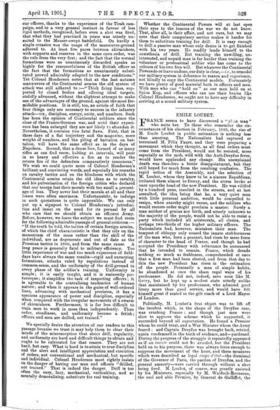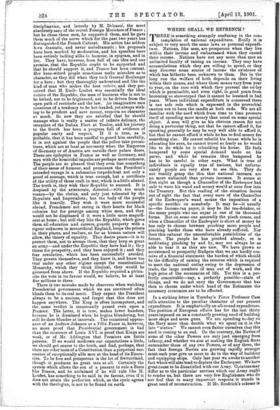EMILE LOUBET. F RANCE seems to have discovered a "p1 in
man" who suits her. To those who remember the cir- cumstances of his election in February, 1899, the rise of M. Emile Loubet in public estimation is nothing less than amazing. The Nationalists had captured or terrorised M. Felix Faure, and they were preparing a movement which they thought, as all final orders must come from the President, would not be resisted, more especially as the mob, wild with the Anti-Dreyfus fever, would have applauded any change. His unexplained death was therdore a bitter disappointment, but they still hoped for much from the resulting confusion. The rapid action of the Assembly, and the selection of M. Loubet, whom they knew to be a sincere Republican, irritated them almost to frenzy, and the storm broke at once upon the head of the new President. He was vilified by a hundred pens, insulted in the streets, and at last assaulted, the idea being that he, a very quiet man with little personal ambition, would be compelled to resign, when anarchy might ensue, and the soldiers who would restore order might proclaim a master. Surely a man neither of genius nor birth, and utterly unknown to the majority of the people, would not be able to resist a party which included all aristocrats, all clerics, and perhaps two-thirds of the higher military officers. The Nationalists had, however, mistaken their man. The tempest of obloquy only roused the innate stubbornness of the man who, born a peasant, had risen by mere force of character to the bead of France, and though he had accepted the Presidency with reluctance he announced that he intended to remain. France, which dreads nothing so much as feebleness, comprehended at once that a firm man had been elected, and from that day to this the new President has risen in the estimation of the people. Personally a man of simple habits, he abandoned at once the sham regal ways of his predecessor. He did not, indeed, save sous like M. Grevy, but he kept up a modest state utterly unlike that maintained by his predecessor, who admired good livery more than good service, and would have felt himself great if seated in the gilt coach of a Lord Mayor of London.
Politically, M. Loubet's first object was to lift off the incubus which, in the shape of the Dreyfus case, was crushing France ; and though just men were slow to approve the scheme which be supported, it succeeded beyond all expectation. He found a Premier whom he could trust, and a War Minister whom the Army feared ; and Captain Dreyfus was brought back, retried, again condemned in the teeth of evidence, and—pardoned. During the progress of the struggle it repeatedly appeared as if an inzemtn could not b-.3 avoided, but the President held on to his purpose, there was always force enough to suppress the movement of the hour, and three measures which were described as legal cups d'etat—the dismissal of the Governor of Paris, the pardon of Dreyfus, and the general amnesty—were carried through without a shot being fired. M. Loubet, of course, was greatly assisted by his Ministers, especially by M. Waldeck-Rousseau, the cool and able Premier, by General de Galliffet, the disciplinarian, and latterly by M. Delcasse, the most absolutely sane of the recent Foreign Ministers of France ; but he chose these men, he support( d them, and he gave them much of the nerve which for the past two years has distinguished the French Cabinet. His action has seldom ben dramatic, and never melodramatic ; his proposals have been marked by moderation, and his speeches have been entirely lacking alike in humour, in epigram, and in fire. They have, however, been full of one idea and one promise, that the Republic ought to be supported and that he should support it, and France has been content. Her keen-witted people sometimes make mistakes as to character, as they did when they took General Boulanger for a hero ; but they thoroughly understand and like the kind of man who makes the best no faire, and they per- ceived that M. Emile Loubet was essentially the ideal no faire of the Republic, the man of business who is not to be bribed, not to be frightened, not to be driven from the open path of rectitude and the law. Au imaginative race conscious of a tendency to be hot-headed, yet always wish- ing to be prudent and save money, respects no character so much. So now they are satisfied that he should manage what is really a matter of infinite delicacy, the reception of the Italian Fleet at Toulon, and his journey to the South has been a progress full of evidence of popular amity and respect. If it is true, as is probable, that it has been needful to guard him carefully, it is not against the people that the police take precau- tions, which are at least as necessary when the Emperors of Germany or of Austria are outside their palace doors. There are epileptics in France as well as Germany, and men with the homicidal impulse are perhaps more common. The people are so pleased•that they even lose something of theirsense of humour, and pronounce the President's intended voyage in a submarine torpedo-boat not only a proof of courage, which is true enough, but a certificate of the utility of those craft in war,- which is a little absurd. The truth is, they wish their Republic to succeed. It is despised by the aristocrats, detested—with too much reason—by the clerics, and only just tolerated by the Royalists and Imperialists; but the body of the people like it heartily. They wish it were more successful abroad, Frenchmen not caring in their hearts for black colonies but for prestige among white men, and they would not be displeased if it were a little more magnifi- cent at home; but still they like the Republic, which gives them all education and careers, guards property with a rigour unknown in monarchical England, keeps the priests in their places, and realises, so far as human nature will allow, the theory of equality. They desire peace—it is to protect them, not to avenge them, that they keep so great an army—and under the Republic they have had it ; they thirst for prosperity, and they have enjoyed it ; and they fear revolution, which has been successfully avoided. They govern themselves, and they know it, and know too that under any other regime except the constitutional Monarchy, which they tbink illogical, they would be governed from above. If the Republic required a plebis- cite the vote in its favour would, we believe, be at least five millions to three.
There is one mistake made by observers when watching Presidential government which we are convinced often blinds them to its real merit. They expect the President always to be a success, and forget that this does not happen anywhere. The King is often incompetent, and the, same verdict is occasionally passed even upon a Premier. The latter, it is true, makes fewer bunders, because he is dismissed when he begins blundering, but still he does blunder at intervals. The occasional appear- ance of an Andrew Johnson or a Felix Faure is, however, no more proof that Presidential government is bad than the existence of Louis X VI. is proof that Kings are weak, or of Mr. Addington that Premiers are futile persons. If we would moderate our expectations a little, we should get nearer to the truth, and find, perhaps, that there are other tests of a Constitution than a perpetual suc- cession of exceptionally able men at the head of its Execu- tive. To be free and prosperous is the lot of Switzerland, though it produces no great men at all. Certainly the system which allows the son of a peasant to rule a State like France, and be acclaimed if he will rule like M. Loubet, has something to be said in its favour, even if it does not attain the perfection which, as the cynic agrees with the theologian, is not to be found on earth.







































 Previous page
Previous page